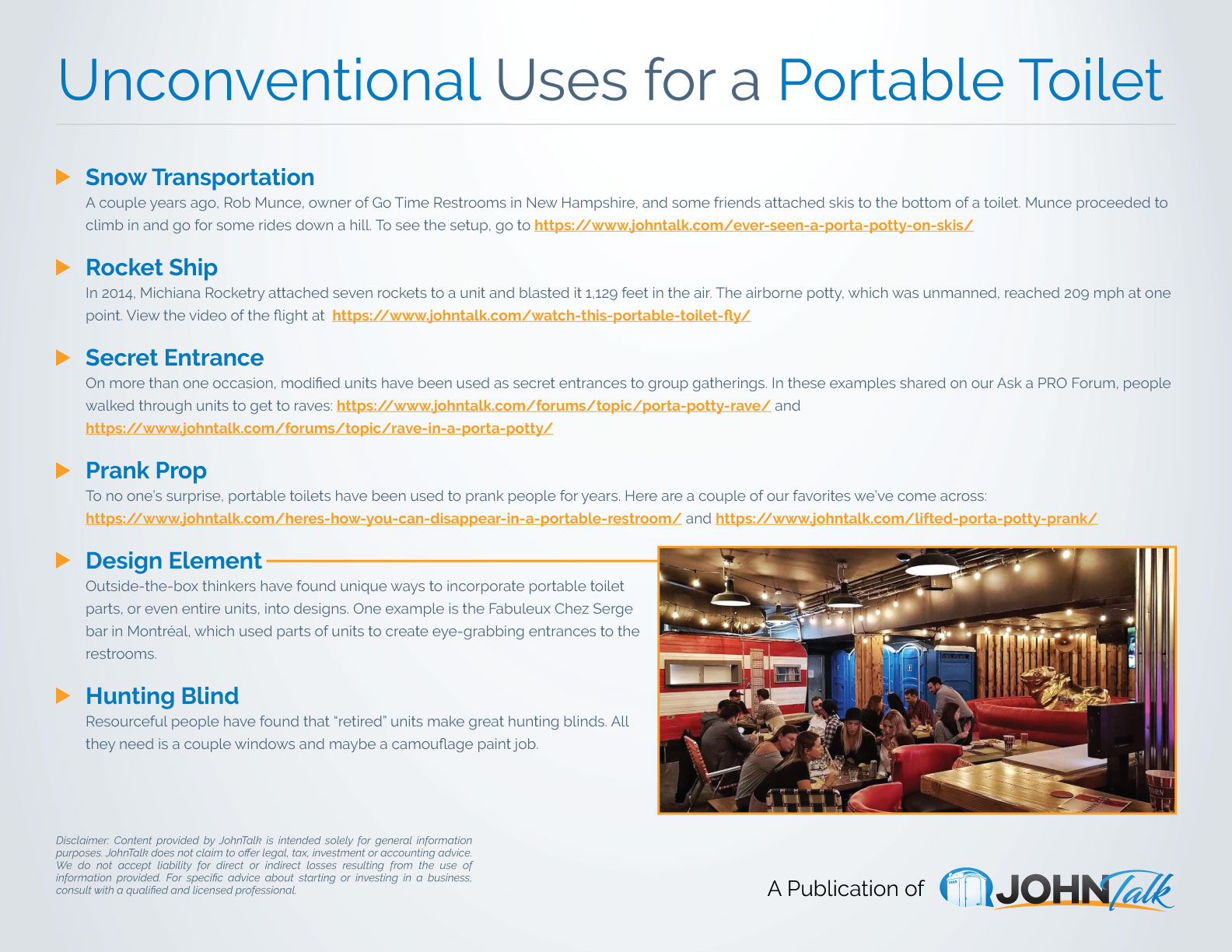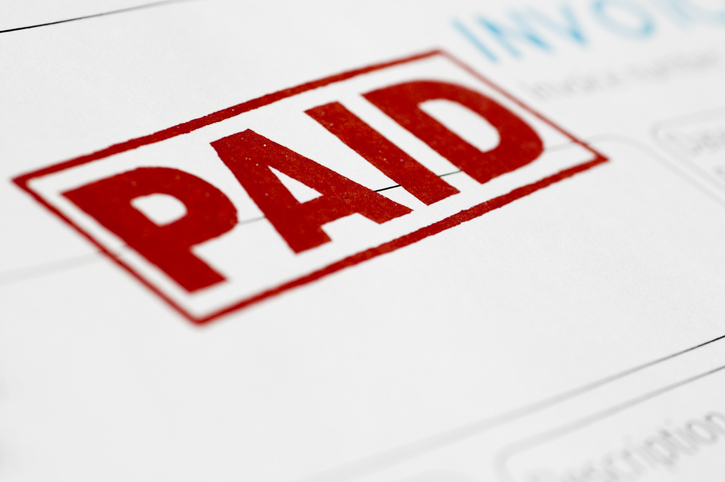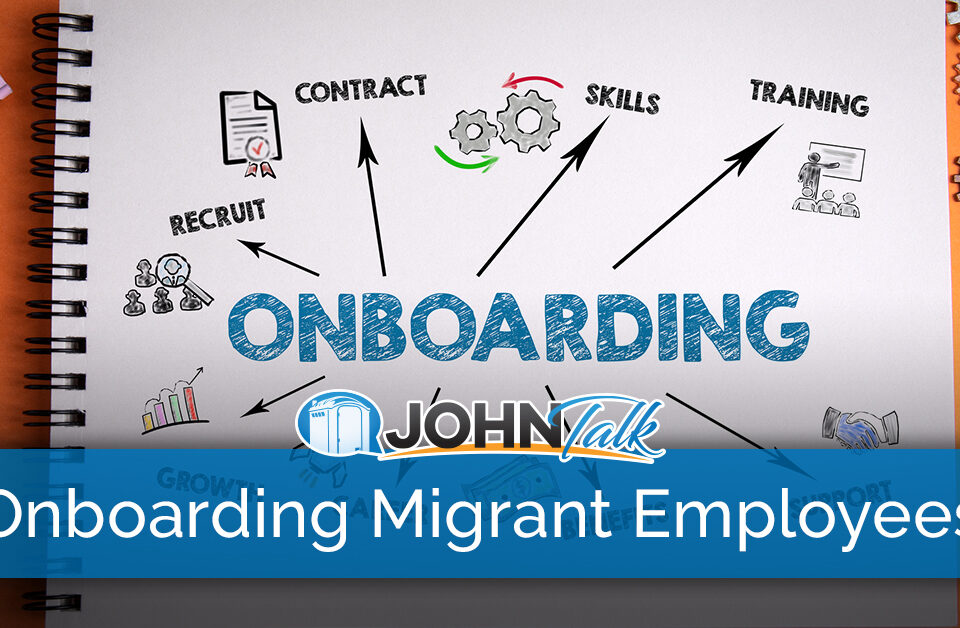
INFOGRAPHIC: Unconventional Uses for a Portable Toilet
June 24, 2019
What Are the Most Effective Collections Activities?
July 1, 2019Looking to hire? You’ve got lots of competition.
In December 2018, The Conference Board, a nonprofit business research organization, reported that companies are now having a more difficult time finding blue-collar workers than white-collar workers and forecasted that labor shortages will continue in 2019 and beyond.
Sectors of the economy that are having an especially hard time are those that can impact hiring in portable sanitation, including traditional manufacturing, agribusiness and construction.
Portable sanitation owners face three critical challenges when hiring. These issues are relevant at all times, but they are heightened in the current economic climate:
- How do you attract the right kinds of candidates?
- What are the best ways to get your message out to candidates?
- How do pay and benefits packages need to evolve to stay competitive and retain candidates?
How Do You Attract the Right Kinds of Candidates?
If you’ve never hired before, research and learn about the basics of hiring. If you are working with a SCORE business mentor, discuss the issue well in advance of your hiring plans.
SCORE offers a thorough guide, “A Step-by-Step Guide to Hiring Your First Employee.”
ALWAYS SELL THE INDUSTRY
Portable sanitation is a unique profession. Most people view cleaning waste negatively, but few in the business feel that way. A “minus” to some is a “plus” for others.
Look for opportunities to communicate the characteristics of portable sanitation as an advantage, not a liability. These aspects might stand out as selling points.
- Responsibility – Your route is your responsibility. You do it all – drive the truck, maintain equipment, load and unload units, service the units, meet with customers on-site, answer questions, make decisions, unload the tank, meet your schedule.
- Independence – Although you are an employee, you’re basically on your own. It’s a little bit of freedom every day.
- Outdoor, physical work – You’re not stuck in an office all day. You’re physically active and hustling in an outdoor setting.
- Challenge – Portable sanitation isn’t boring, and not everyone can or is willing to do the job. You work in heat, rain and cold. You run into problems, like clogged hoses and tipped units. You start early and work late. You handle emergencies.
- Image – Because you are in the public all the time, your attitude and performance are the most effective advertisements for the company and industry you work for.
- Does not require an extensive education –You need to be able to drive a truck, use portable sanitation equipment and perhaps use routing software. Qualities like honesty, dependability and confidence are more important than education.
- Helping the environment – Portable sanitation operators are at the front line for helping keep our world cleaner and more sanitary.
- Long career potential – A good route driver is a valuable employee. You can expect to work as long as you want in the industry.
- Learn the business – If you find out that you like portable sanitation, you can learn from the ground up how to run your own business.
- Grateful customers – Sure, you get complaints. But there is a lot of satisfaction in “saving” a wedding, party or public event by coming through with an emergency delivery of units. Or, when you receive compliments for the cleanliness of your units or the promptness of your service.
What others can you come up with?
What are the Best Ways to Get Your Message Out to Candidates?
Candidates could be as close as your own home or they could be anywhere in the job market. In order to connect with them, you must first create awareness that you are looking for help.
Networking
Before you put out a “Help Wanted” sign targeting the general public, you may be able to attract candidates by networking.
Family first
Have you talked to your partner? Some of the hardest-working, most dependable workers in the industry are members of the family. Husband-and-wife teams are common in portable sanitation.
Owners often involve their children in the business from an early age, as summer help, for example, and see them take on more and more responsibility through the years. It is an especially worthwhile business relationship to have when it comes to succession planning — when your children will take over the business from you.
There are unique challenges to employing family, such as treating other employees with the same respect as family members. The SBA (Small Business Association) offers a helpful article, “5 Challenges for Family-Owned Businesses.”
Recruit where you service
The workers who use your services, especially on construction, industry and agricultural work sites, often make ideal candidates. They are used to physical labor and outdoor conditions. If a laborer shows some curiosity about the business – asking questions, for example – it’s an opportunity to establish a relationship.
Talk to the business community
Put out the word that you are interested in hiring to business owners you know through your local Chamber of Commerce or officials in municipal offices of the cities you service. They are always receiving inquiries from job-seekers.
Call in the military
Hire a vet! According to the SBA, approximately 230,000 to 245,000 service men and women leave the military each year. Hiring a vet is good for your company’s reputation as military-friendly, and it gives veterans a helping hand to repay them for their service.
If you are a federal contractor or subcontractor, the Office of Federal Contract Compliance Programs (OFCCP) requires you to take affirmative action to recruit and hire veterans.
Small business owners may also qualify for the work opportunity tax credit (WOTC) if you hire a veteran who falls into certain categories.
Here is the U.S. Department of Labor’s “Employer Guide to Hire Veteran.”
Consider people recently released from prison
There is a wide pool of potential employees that a number of portable sanitation businesses have been slowly incorporating into their workforce – people recently released from prison. It is estimated that one-third of adults in the U.S. have at least an arrest record.
[You’re probably most familiar with common terms such as “ex-con,” “ex-convict,” “ex-felon” and “ex-offender,” but many consider these to be harmful descriptions. The Prison Studies Project, for example, suggests using terms such as “people formerly incarcerated” or “people recently released from prison.”]
On social media dedicated to portable sanitation, you will find a wide range of viewpoints on this aspect of hiring, both positive and negative. But according to a report by the Society of Human Resource Management, business executives say 82 percent of hires of people who have been recently released from prison have been at least as successful as their average hire.
As with certain veterans, the federal government offers the WOTC for employers who hire and retain people recently released from prison. Some cities and states also offer tax credits and other incentives to employers willing to hire them.
According to CNBC, employers can partner with local organizations that work to train people recently released from prison for jobs. Your state unemployment or workforce development offices can offer referrals to these organizations.
The Federal Bonding Program is another option. This program bonds people recently released from prison who are hired. The bond provides compensation if an employer suffers theft or loss due to the employee’s dishonesty.
Go public
The widest pool of candidates is the general public. Advertise in local newspapers, Craigslist and professional websites such as Indeed, Monster, Glassdoor, CareerBuilder and SimplyHired.
Here’s a sample ad:
XYZ company is growing and we’re searching for a portable sanitation service technician. As a service tech, part of your job will be driving a company vehicle. We pride ourselves on hiring a driver with an outstanding record to ensure equipment is properly cared for. The job also requires physical labor and attention to detail. If you are someone who enjoys working hard outdoors, working mostly independently, and “sweating the details,” then this is the job for you! Occasional customer interaction is expected, so XYZ will provide the uniform! Driving experience is preferred, but we will train the right candidate. Minimum of a chauffeur license required — CDL B (with tanker endorsement preferred). Candidates must be able to obtain a DOT Medical Card. Apply today!
Put together a job application form that you can email or send to applicants. There are generic forms available on the internet that you can edit to your needs.
The Interview Process
Review the applications for candidates who stand out. You can begin the interview process over the phone.
You may want to include the following questions in the application and/or phone interview:
- Work history
- Reasons for leaving previous job
- Starting and ending pay
- Years of commercial driving experience
- Types of vehicles driven
- Tickets/accidents/driving record for the last 5 years
- DOB (you are allowed to ask this for a commercial driving job)
- Current/active DOT physical
- Drug and alcohol test (if required by your insurance)
- Highest level of education received
- Can you read a map?
- Can you use a GPS?
- How long have you lived in the service area?
- Are you familiar with the service area?
- Can you do repetitive tasks and lift 50 lbs. regularly in all weather conditions?
- Have you ever hauled a trailer before (or pulled a boat, camper, etc.)?
- Criminal record for last 7 years (not required to document anything that has been expunged)
- References
On-site interview
Invite your top candidates for an on-site interview. Here, you can discover additional indicators about their qualifications.
Answer any questions they have. Explain the realities of the schedule, such as working weekends in the summer. Explain that emergencies happen and workload is often unpredictable.
Give the candidates a tour of your site. Show them how to load, unload and clean a unit, and have them try it. (Let them know ahead of time, so they can dress casually.) Explain the steps you take.
Hiring and onboarding
Don’t expect immediate success. Every time you hire, you’ll recruit many candidates before you find the right person. But when you do, welcome your new employee, and have a plan to help them get up to speed. We call it the on-boarding process.
Start your new employee on Monday. For the first week (or however long you decide), accompany your new hire. Have them do the work while you supervise.
Emphasize to your employee that the job is more than cleaning toilets. It’s cleaning well, driving safely, being knowledgeable, communicating well, following instructions, being polite and friendly, and looking for new opportunities. Show them the professionalism you expect by conducting yourself professionally.
Get the JohnTalk “ALL-ACCESS PASS” & become a member for FREE!
Benefits Include: Subscription to JohnTalk Digital & Print Newsletters • JohnTalk Vault In-Depth Content • Full Access to the JohnTalk Classifieds & Ask a PRO Forum
How Do Pay and Benefits Packages Need to Evolve to Stay Competitive and Retain Employees?
If you already have employees, review your company policies for opportunities that might make the job more attractive. When first creating your employee policies, you may want to consult with your attorney or an employment law attorney to make sure you’re in compliance with all applicable laws. You might also consider hiring a Human Resources consultant.
These suggestions may help you achieve both your company’s hiring goals and the goals of today’s job-seekers:
Increased wages
The Conference Board reports that companies looking to attract blue-collar workers will have to continue increasing wages and possibly experience diminished profits. For example, the reported noted that many trucking companies now pay six-figure salaries.
According to PSAI, the mean annual income for portable sanitation technicians is $37,870. Payroll per employee in 2016 was up to $45,174.
Offer optional employee benefits
Offering optional benefits can mean the difference in hiring and retaining employees.
- Health insurance
If you have fewer than 50 employees, providing health insurance is optional, but it is one of the most desirable benefits a company can offer. The Small Business Health Options Program (SHOP) is for small employers who want to provide health and/or dental insurance to their employees.
- Retirement plans
Starting a retirement savings plan can actually be fairly easy. These plans not only have a lot of appeal to employees but may help them focus more on the benefits of staying with your company long-term. A retirement plan gives tax advantages for the employer as well as tax credits.
An excellent introduction is “Choosing a Retirement Solution for Your Small Business.”
- Paid vacation, sick days and holidays
The Bureau of Labor Statistics reports that nearly 75% of private industry workers receive between five and 14 days of paid vacation per year after one year of service.
Arizona, California, Connecticut, Maryland, Massachusetts, Michigan, New Jersey, Oregon, Rhode Island, Vermont, Washington and Washington, D.C. require private employers to offer paid sick leave, as do some localities such as Chicago, San Francisco, Minneapolis, New York and Philadelphia.
Offering paid holidays is difficult if not impossible in some situations for the portable sanitation owner because holidays can be your busiest times! If you offer paid vacation, you may be able to compensate with additional days off. Some employers combine vacation, sick time and personal time into one paid time off (PTO) policy for employees to use at their discretion.
- Employee incentives
Employee incentive programs can boost morale, although a number of common incentives are usually not available to the small portable sanitation business owner, such as flexible hours and stock options. Consider some smaller-scale incentives that show your regard for your employees – like a company-sponsored employee dinner, a day at the water park or a baseball game.
- Bonuses
A bonus can be as simple as a gift card or a significant amount of money. There are many times when a bonus can show your employees that they are appreciated and valued:
- Signing Bonus: when a candidate is hired and completes a probationary period of employment
- Performance-based Bonus: for extraordinary effort
- Referral Bonus: when an employee recruits a job candidate who is hired
- Holiday Bonus: as a way of thanking your employees for their service during the past year
- Year-end Bonus: different than a holiday bonus, it’s usually based on certain factors such as years of service and performance
- Incorporate pay and benefits into a welcoming workplace
Finally, recognize that keeping your employees has a lot to do with more than pay and benefits, but your professional relationship with them and the workplace environment you create. In a 2015 survey by the Society for Human Resource Management (SHRM), these were the top five aspects of employee job satisfaction rated as very important:
1. Respectful treatment of all employees
2. Compensation/pay
3. Benefits
4. Job security
5 (tie). Trust between employees and senior management
5 (tie). Opportunities to use your skills and abilities in your work
By running every facet of your portable sanitation business to the highest standards, you show prospective employees that you are an employer they will want to work for.
Looking to Take Your Portable Restroom Business to the NEXT LEVEL? Download our FREE Guide: “Your Guide to Operating A Portable Restroom Business.”
Thinking About GETTING INTO the Portable Restroom Industry? Download our FREE Guide: “Your Guide to Starting A Portable Restroom Business.”






